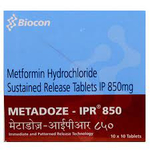omet
Introduction to Omet
Omet is a widely prescribed medication primarily used to manage blood sugar levels in individuals with type 2 diabetes. Its main ingredient, Metformin, is renowned for its effectiveness in controlling high blood sugar, which helps prevent kidney damage, blindness, nerve problems, loss of limbs, and sexual function issues. Managing diabetes with Omet may also reduce the risk of a heart attack or stroke. Available in various forms, including tablets, injections, and syrups, Omet offers flexibility in administration to suit different patient needs.
Composition of Omet
The active ingredient in Omet is Metformin, present in a dosage of 850mg per tablet. Metformin belongs to the class of drugs known as biguanides. It works by decreasing the amount of sugar produced by the liver, increasing the sensitivity of muscle cells to insulin, and reducing the absorption of sugar in the intestines. These actions collectively help in lowering blood sugar levels, making Metformin a cornerstone in the treatment of type 2 diabetes.
Uses for Omet
- Management of type 2 diabetes
- Control of high blood sugar levels
- Prevention of diabetes-related complications such as kidney damage, blindness, and nerve problems
- Reduction of the risk of cardiovascular events like heart attack and stroke
Side Effects of Omet
- Nausea and vomiting
- Diarrhea
- Stomach upset
- Weakness
- Metallic taste in the mouth
- Rarely, lactic acidosis (a serious condition)
Precautions for Omet
Before starting Omet, inform your doctor if you have any allergies, kidney or liver problems, or if you consume alcohol regularly. It is crucial to maintain a balanced diet and exercise routine while taking this medication. Regular monitoring of blood sugar levels is advised to ensure the medication's effectiveness. Pregnant or breastfeeding women should consult their healthcare provider before using Omet. Avoid using Omet if you have severe kidney disease or diabetic ketoacidosis.
Conclusion
Omet, with its active ingredient Metformin, plays a vital role in managing type 2 diabetes effectively. Available in tablets, injections, and syrups, it offers versatile options for administration. While it is generally well-tolerated, it is important to be aware of potential side effects and take necessary precautions. Always consult with a healthcare professional to ensure that Omet is the right medication for your diabetes management plan.
Similar Medicines
Available in 2 variations

Omet 850mg Tablet
Omet 850mg Tablet
strip of 10 tablets

Omet 500mg Tablet
Omet 500mg Tablet
strip of 10 tablets
Related Posts

1:15
5 Healthier Sugar Alternatives!

1:15
Pregnancy and Diabetes: What to Eat? | Foods to Eat for Gestational Diabetes!

1:15
How Can You Naturally Boost Your Child’s Immunity and Keep Them Healthy?

1:15
What Are the Best Foods to Keep Your Kid’s Brain Healthy?

1:15
How Does Vitamin D3 Deficiency Affect Your Body? Shocking Symptoms Revealed!

1:15
Why Is Calcium Important for Kids? Common Deficiency Symptoms You Shouldn’t Ignore!

1:15
How to Increase Your Child’s Weight Naturally? Healthy Diet Tips for Parents!





















.svg)
